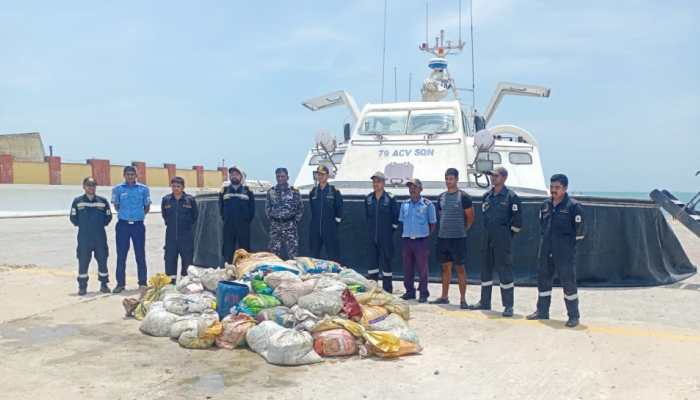Indian Coast Guard seizes 2 tons of endangered sea cucumber worth Rs 8 crore
The boat along with seized sea cucumbers was brought to Mandapam and handed over to forest officials.
- Indian Coast Guard seized 2 tons of sea cucumber
- The value of the consignment was said to be around Rs. 8 crores
- Sea Cucumbers are an endangered marine species
Trending Photos
)
Chennai: Based on a tip-off, the Indian Coast Guard team at Mandapam, Ramanathapuram, Tamil Nadu seized a 2-ton shipment of marine species Sea Cucumber, that was being smuggled via Indian waters. Early on Sunday, Coast Guard teams in the Gulf of Mannar and Palk Bay areas tracked the boat and laid a cordon to block the suspect vessel at sea.
Sea cucumbers are an important constituent of the marine ecosystem as they play an important role in maintaining the health of the ecosystem. In India, Sea cucumber is treated as an endangered species listed under schedule 1 of the Wildlife Protection Act of 1972.
The boat which was found anchored 15kms off the Vedalai South locality in Mandapam was boarded and searched by an ICG team. The boarding team of ICG Hovercraft H-183 recovered 200 gunny bags of sea cucumber weighing 2000kg or 2 tons. The boat along with seized sea cucumbers was brought to Mandapam and handed over to forest officials. The value of seized sea cucumbers is said to be around Rs.8 crores.
According to the Coast Guard, an investigation revealed that the consignment was planned for transshipment across the International Maritime Boundary Line during dark hours. Sea cucumbers are in high demand in China and Southeast Asia, where it is consumed as food and used in medicine. This endangered species is primarily smuggled from Tamil Nadu to Sri Lanka in fishing vessels from Ramanathapuram and Tuticorin districts.
By excreting inorganic nitrogen and phosphorus, they enhance the productivity of benthic animals - those living on the ocean floor. One of the by-products of the sea cucumber's digestion of sand is calcium carbonate, a key component of coral reef. To survive, coral reefs must accumulate calcium carbonate, and thus sea cucumbers play a vital role in their preservation. Sea cucumbers also maintain the transparency of seawater by eating sewage. Feeding and excretion by sea cucumbers also increase alkalinity, which counteracts ocean acidification. Illegal harvesting and overexploitation of these animals leads to poorer sediment health, reduces nutrient recycling and impacts biodiversity.
On 18th September, in order to mark International Coastal Cleanup Day, the ICG led school and college students, NCC cadets, volunteers to conduct a cleanup along India’s coast. The 7000-member strong effort led to the collection of 44 tons of plastics and garbage from the oceans and beaches, spread across 44 locations.
Stay informed on all the latest news, real-time breaking news updates, and follow all the important headlines in india news and world News on Zee News.
Live Tv







)
)
)
)
)
)
)
)
)
)
